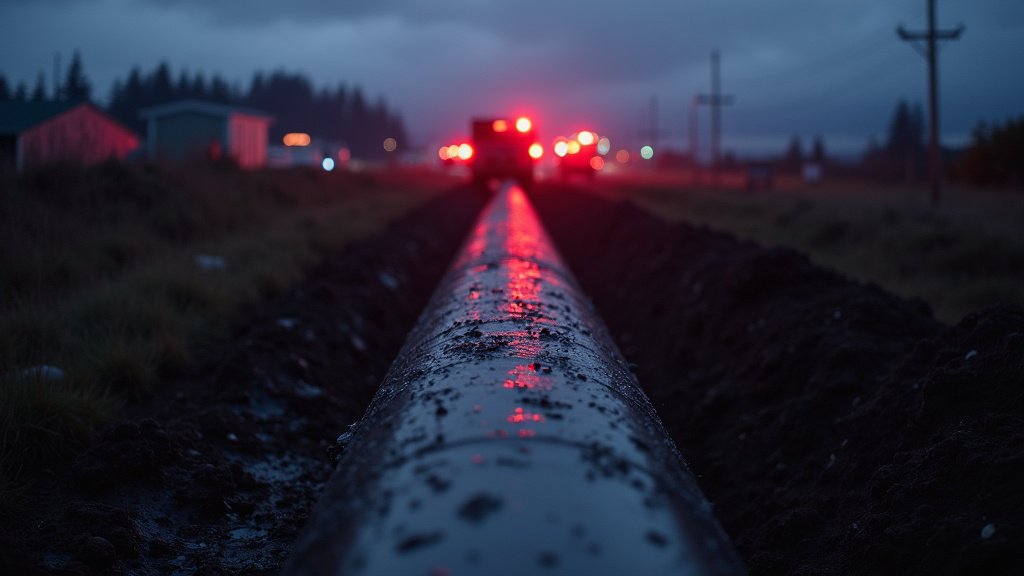A significant Olympic Pipeline Leak discovered on November 11, 2025, has forced a complete shutdown of the critical 400-mile system, jeopardizing fuel supplies across the Pacific Northwest and raising concerns for travelers heading into the busy Thanksgiving holiday weekend. U.S. Senator Maria Cantwell has urgently demanded answers from BP, the pipeline’s operator, citing a pattern of spills and questioning the company’s BP pipeline safety protocols. The shutdown has prompted Washington Governor Bob Ferguson to declare a Washington state of emergency, enacting measures to ensure essential fuel deliveries, particularly jet fuel to Seattle-Tacoma International Airport (SEA-TAC), a crucial aspect of the SEA-TAC fuel supply.
Olympic Pipeline Leak Halts Key Fuel Deliveries
The Olympic Pipeline, a vital artery for the region, transports gasoline, diesel, and jet fuel from refineries along Puget Sound to distribution terminals serving major population centers in Washington and Oregon. On November 11, 2025, a leak was identified near Everett, Washington, originating from one of two parallel pipelines operating in the area. BP, the pipeline operator, confirmed the leak after a sheen was observed in a drainage ditch on a blueberry farm. Both pipelines were initially shut down to investigate the source of the Olympic Pipeline leak. While the smaller, 16-inch pipeline briefly resumed operations, BP shut down the entire system again on November 17 as further issues were noted. As of November 21, 2025, BP reported that response crews were excavating the pipelines, but no timeline had been established for their restart after the Olympic Pipeline leak.
Senator Cantwell Presses BP on Safety and Impact of Olympic Pipeline Leak
Senator Maria Cantwell, Ranking Member of the Senate Committee on Commerce, Science and Transportation, has directly challenged BP’s operational integrity in a letter to CEO Murray Auchincloss regarding the recent Olympic Pipeline leak. “The fact that a blueberry farmer—not BP—first identified the spill, and that it is still not known for certain which of the two pipelines is leaking, raises significant concerns about the capabilities of the Olympic Pipeline’s leak detection systems and the adequacy of your inspection and maintenance programs,” Cantwell stated. The senator also highlighted that equipment failure has been cited as the cause for numerous previous Olympic Pipeline spills since 1999.
Cantwell is seeking detailed answers regarding the cause of the Olympic Pipeline leak, BP’s mitigation efforts, the dates and findings of the pipeline’s most recent inspections in the affected area, and the specific impact the shutdown will have on Regional gas prices during the critical Thanksgiving travel disruption period. She expressed concern that the incident could lead to increased gasoline costs for residents in Western Washington due to the Olympic Pipeline leak.
Governor Declares Emergency to Avert Travel Chaos Amidst Olympic Pipeline Leak
Recognizing the immediate threat to transportation and public safety posed by the Olympic Pipeline leak, Governor Bob Ferguson declared a Washington state of emergency on November 19, 2025. This declaration allows for the temporary waiver of state regulations that limit the hours commercial truck drivers can operate while transporting jet fuel. This measure is crucial for increasing the capacity of road-based fuel deliveries to SEA-TAC, which relies heavily on the Olympic Pipeline for its jet fuel supply.
SEA-TAC, projected to handle approximately 900,000 travelers during the Thanksgiving holiday, faces the potential for “significant disruption” to airport operations if fuel deliveries cannot resume by Saturday evening, November 22. Airlines have already been notified to fuel inbound flights to capacity—a practice known as “ferrying fuel”—to reduce their reliance on airport refueling. Major air carriers, including Alaska Airlines and Delta Air Lines, are implementing contingency plans, such as increasing trucking operations and assessing alternative fueling strategies in light of the Olympic Pipeline leak. As of November 21, airlines reported no current disruptions to operations at SEA-TAC.
Broader Impact on Fuel Prices and Supply Due to Olympic Pipeline Spill
The shutdown’s implications extend beyond aviation, affecting the Pacific Northwest fuel supply across the region. The Olympic Pipeline is a primary conduit for these fuels to distribution terminals in both Washington and Oregon. News reports indicate that previous shutdowns of this Olympic Pipeline spill have led to significant spikes in gas prices in the region. While the immediate impact on Oregon’s average gas prices had been minimal as of November 18, 2025, analysts warn that the situation is fluid and could lead to higher prices as the holiday travel demand intensifies, exacerbated by the current Olympic Pipeline leak.
A Troubling History of Incidents Linked to Olympic Pipeline Operations
The current incident adds to a documented history of problems with the Olympic Pipeline. Previous spills include a significant gasoline release near Conway in December 2023, which sent approximately 25,000 gallons into local waterways and necessitated extensive cleanup. Most tragically, an explosion in Bellingham, Washington, in June 1999, resulted from a pipeline rupture and killed three people. These recurring issues have led watchdog groups to call for greater transparency and accountability from BP regarding BP pipeline safety and maintenance following the latest Olympic Pipeline leak.
As cleanup and repair efforts continue following the Olympic Pipeline leak, the focus remains on restoring the pipeline’s integrity and ensuring the safe and reliable delivery of fuel. The coming days will be critical in determining the extent of disruption to Thanksgiving travel and potential price fluctuations for consumers throughout the Pacific Northwest.




